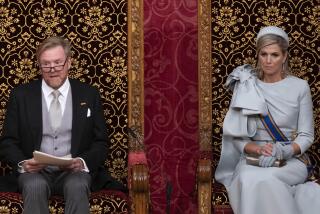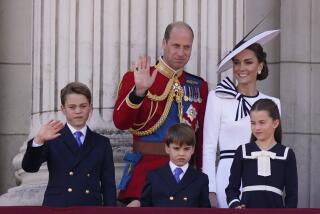Dutch get a new monarch: Willem-Alexander succeeds Beatrix
LONDON -- With an exchange of smiles and the flourish of a pen, Queen Beatrix of the Netherlands abdicated the throne and her son Willem-Alexander took her place Tuesday to become the country’s first king in more than a century.
In a simple morning ceremony in Amsterdam’s royal palace, Beatrix, 75, signed the document that ended her 33-year reign. Willem-Alexander added his name a few seconds later. Mother and son then clutched hands and smiled, their status transformed at a stroke from queen and crown prince to princess and king.
Willem-Alexander, who turned 46 on Saturday, is the first male monarch to reign over the Netherlands since 1890, a 123-year span that has seen three women ascend to the throne and resign in turn in favor of the next generation.
Thousands of Dutch -- many of them clad in orange, the color of the royal House of Orange-Nassau -- cheered in Amsterdam’s Dam square as now-Princess Beatrix, King Willem-Alexander and his wife, Queen Maxima, appeared on the palace’s balcony less than half an hour after the official handover of power.
“Dearest mother, today you relinquished the throne [after] 33 moving and inspiring years,” Willem-Alexander told Beatrix as the crowds shouted in acclamation. “We are intensely, intensely grateful to you.”
The three royals sang along as the Dutch national anthem was played, and Beatrix fought back tears.
Though historic, the change at the top was accompanied by far less pageantry and splendor than would be found at the same event in Britain, whose monarchy is a much more ancient and ritual-laden institution. The Dutch monarchy is only about 200 years old and reflects a simpler, more down-to-earth approach in keeping with the national character.
Indeed, the Dutch do not even call the event a coronation but rather an inauguration. The monarch does not wear a crown.
As king, Willem-Alexander is the country’s head of state. The post is largely ceremonial; the prime minister remains the country’s political leader in the Netherlands’ parliamentary democracy.
But the monarchy is extremely popular, viewed by most Dutch as a symbol of unity and cohesion that transcends politics and embodies the national identity.
[Updated, 10:45 a.m. PDT April 30: “However great our diversity, however different our convictions and dreams may be, everyone is allowed to make their voice heard,” the new king -- Europe’s youngest -- said in a brief address at his formal investiture later Tuesday. The ceremony was attended by royalty from around the world, including Britain’s Prince Charles and Japan’s Crown Prince Naruhito.]
Beatrix, instantly recognizable by her immaculate coiffure, has been praised for fulfilling her duties with diligence and grace, though without the common touch and matronly air that made her mother, Juliana, an extremely beloved queen. The genial, sports-loving, plane-flying Willem-Alexander is considered to be more in his grandmother’s mold, someone who will restore some warmth to the monarchy.
For her abdication Tuesday morning, Beatrix sat together with Willem-Alexander, the eldest of her three sons, and Maxima, who was born in Argentina, at a long table in the royal palace surrounded by high-ranking officials. The abdication document was passed around the table for each person’s signature in a secular ceremony with no religious overtones.
On the balcony, the new king and his wife were eventually joined by their three children. All are daughters, meaning that once Willem-Alexander’s reign is over, the Netherlands is virtually guaranteed to have a female monarch once again.
ALSO:
The starkly new face of the Netherlands’ monarchy
Seven civilians killed in cargo plane crash at Afghan air base
Declined table at Mexico City cafe, woman sparks political drama
More to Read
Sign up for Essential California
The most important California stories and recommendations in your inbox every morning.
You may occasionally receive promotional content from the Los Angeles Times.










